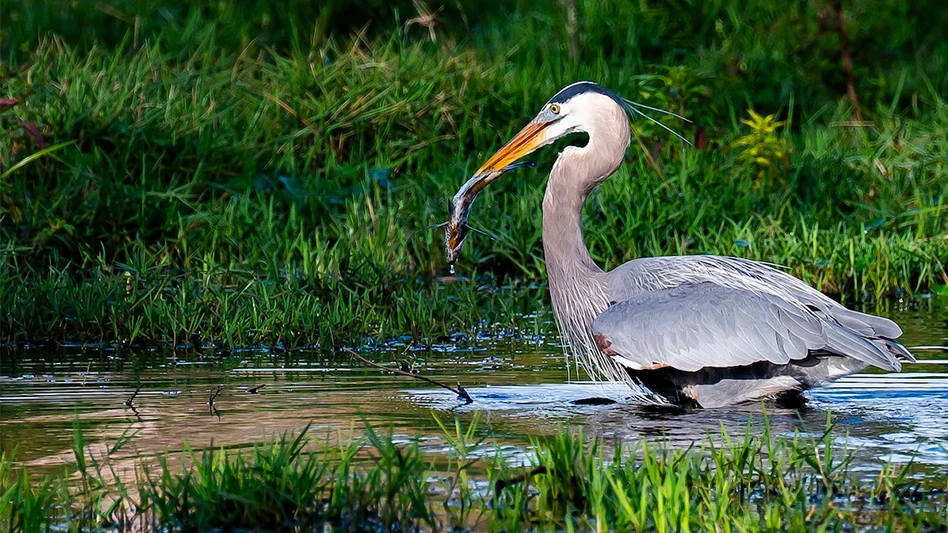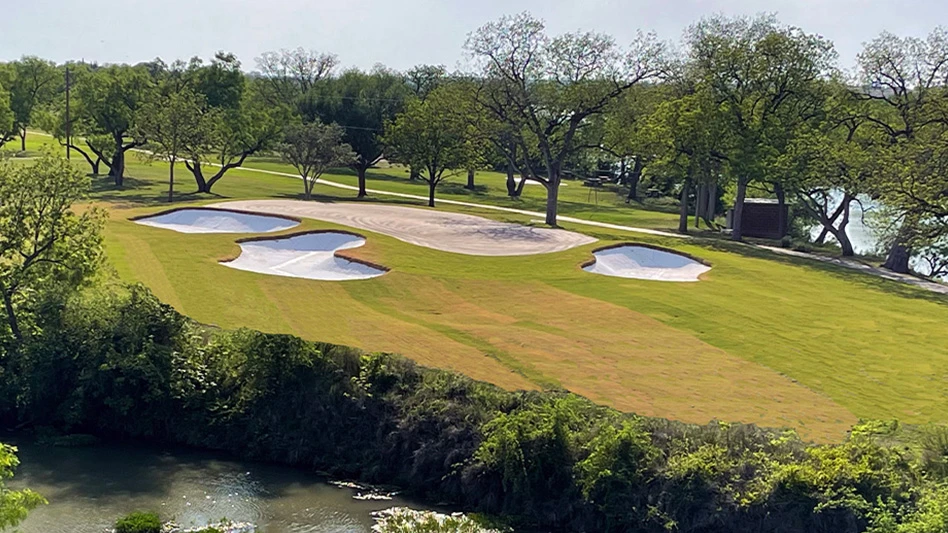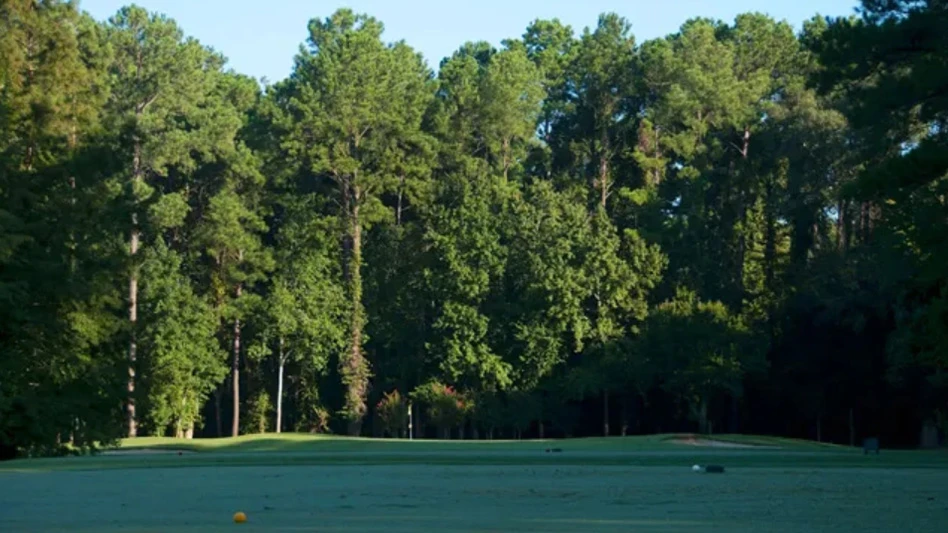The GCN staff presented the 2006 Golf Course News Builder Excellence Awards at the Golf Course Builders Association of America’s awards dinner, which occurred in conjunction with the Golf Industry Show in Atlanta. This year, four awards were presented. Landscapes Unlimited won the Creative Award for best new construction with Laughlin Ranch Golf Club in Bullhead City, Ariz. Ryangolf won the Heritage Award for best reconstruction with Boca West Country Club’s Course No. 2 in Boca Raton, Fla. McDonald & Sons won the Legacy Award for best renovation with Hermitage Country Club’s Manakin Course in Manakin-Sabot, Va. And Mid-America Golf and Landscape won the Affinity Award for best environmental project with Lambert’s Point Golf Course in Norfolk, Va. The following four articles are about these award-winning projects.
Mother Nature played a big role in the renovation of Hermitage Country Club’s Manakin Golf Course in Manakin-Sabot, Va. No rain was followed by heavy rain, and an earthquake occurred on top of it all.
|
|
John Haley, director of golf course operations at Hermitage, joined the staff in November 2000. At that point, the 18-hole Sabot Golf Course was under construction, and the 18-hole Manakin Golf Course wasn’t in good shape.
“Almost immediately we went to work on planning the Manakin renovation,” Haley says. “Superintendent Eric Spurlock and myself had the task of creating a list of golf course architects for the board of directors to interview. We had about 10 names and quickly got the list down to three architects.”
Keith Foster emerged as the architect of choice.
“The chemistry between Keith and our selection committee was there from the beginning, and he was immediately chosen to create a master plan,” Haley says.
For Foster, the attraction to the selection committee was mutual, and the project was extremely attractive.
“[John Haley] and I had a connection and, after meeting him and the committee and talking about where they’d like to take the golf course, I instantly felt this was the right job for me,” Foster says. “Basically, I do everything on instinct. It was very easy for me at that point.”
With few alterations to the master plan, the club agreed to proceed with Phase I in 2003 – which included a $4-million renovation of the Manakin course and the installation of an upgraded irrigation system.
|
|
The task of building the course was given to McDonald & Sons. John McDonald II, vice president of McDonald & Sons, says the company looked forward to working with Haley and Foster, but had no idea what was ahead.
“It looked like a gem in the rough, and we were going to make a gem of it,” McDonald says. “It’s what we do. We do high-end stuff all the time. It didn’t look like anything too difficult.”
ISI Irrigation was chosen to install the irrigation and tie it into the new pump station. ISI was tabbed for several reasons, according to Haley, but primarily because it works a lot with McDonald & Sons. The teamwork put the project in a favorable position before dirt was moved.
“As it turns out, we would need this because the year from hell was about to begin,” Haley says.
The year began with the construction of the pump station and the draining of a 25-acre pond – and an earthquake.
“This is not a common event in Virginia,” Haley says about the earthquake. “As I stood at the base of the dam and my feet wobbled, we all looked at each other confused. No damage was done, but needless to say timing is everything. We got through the pump station just in time to start the renovation, knowing the pump station was a critical piece because the sod and seed would need water.”
“In 99 out of 100 springs, the ponds would be full at the start of the year, but as soon as we drained the lakes, it stopped raining,” Haley says. “This is the pattern we had for two years. When we needed water, it was dry; when we needed to shape or fine-grade, it rained.”
|
At A Glance |
|
Location: Manakin-Sabot, Va. |
With no water in the irrigation pond – because of the lack of rain – work began to pump water back to the pond that had been drained five months earlier. Once that was complete and construction was set to begin, it began to rain and the irrigation ponds filled.
As if weather wasn’t enough of a problem, a change in personnel – at the Department of Environmental Quality and at Heritage’s consulting company – delayed permits. A new person from the DEQ came in and forced the process to begin again.
“This caused a chain reaction of events, including the delays for all the contractors and forced us to go out of sequence or we had no chance of hitting our seeding window,” Haley says.
McDonald says his company has worked on projects that had various delays – be it weather or permitting – but the delays at Hermitage were brutal.
“To have both happen at the same time on the same course is almost unheard of,” he says. “We’d spend one whole day cleaning up after a storm and then another storm came.”
“At the end of the day, that’s what I do … try to encourage people to produce something that we’re all going to be proud of, trying to keep everyone’s enthusiasm up while we were producing something that we all felt was worthy,” Foster says.
More rains and high winds added to the delays and forced the team to change the grass type on the fairways to L-93 bentgrass.
“Three years earlier it would have been a more difficult decision, but our neighbor Pete Wendt at Kinloch Golf Club had already tried it in Richmond, and we felt confident it would work much better than our often unpredictable Vamont Bermudagrass fairways did,” Haley says.
As work was completed on the Manakin Course, the Sabot Course was up and running – generating 40,000 rounds and dealing with the same weather. It was a strain, but by June 2005, the nine holes opened on the Manakin Course.
“We ran three nines almost the entire 2005 golf season, which is nothing short of organized chaos,” Haley says. “That meant that we had to prepare 27 holes for golf and also keep pushing the new nine to be ready in the fall.”
The back nine opened in October 2005 and has exceeded expectations, Haley says. With a full year in the books, all the hard work seems to have paid off.
“The golf course now rests for the first time after the difficult summer of 2005,” Haley says. “The project was completed slightly overbudget, mainly because of the drainage and erosion control adjustments we made with the bentgrass fairways. The money was well spent, and our membership knew it was everything we could do to finish this project and get them back their golf course.”
The team in place made the project a success, according to Foster.
“I knew it all along and in my head I had always anticipated that it would be where it is right now, and it is,” he says. “John and his staff have done an awesome job. I’m thankful for their effort and the job they did with us.”
McDonald agrees.
“This was one of the best cooperative efforts we’ve ever been involved with,” he says. “It was good looking to start out. We had some bumps along the way, but it finished where we wanted it to.”
“All in all, the entire project is a huge success, and now I kind of miss all of the commotion,” Haley adds. “Imagine that.” GCN

Explore the March 2006 Issue
Check out more from this issue and find your next story to read.
Latest from Golf Course Industry
- KemperSports taps new strategy EVP
- Audubon International marks Earth Day in growth mode
- Editor’s notebook: Do your part
- Greens with Envy 66: A Southern spring road trip
- GCSAA’s Rounds 4 Research auction begins
- Quali-Pro hires new technical services manager
- KIOTI Tractor boosts sales leadership, introduces compact loaders system
- Envu adds three new sales managers







